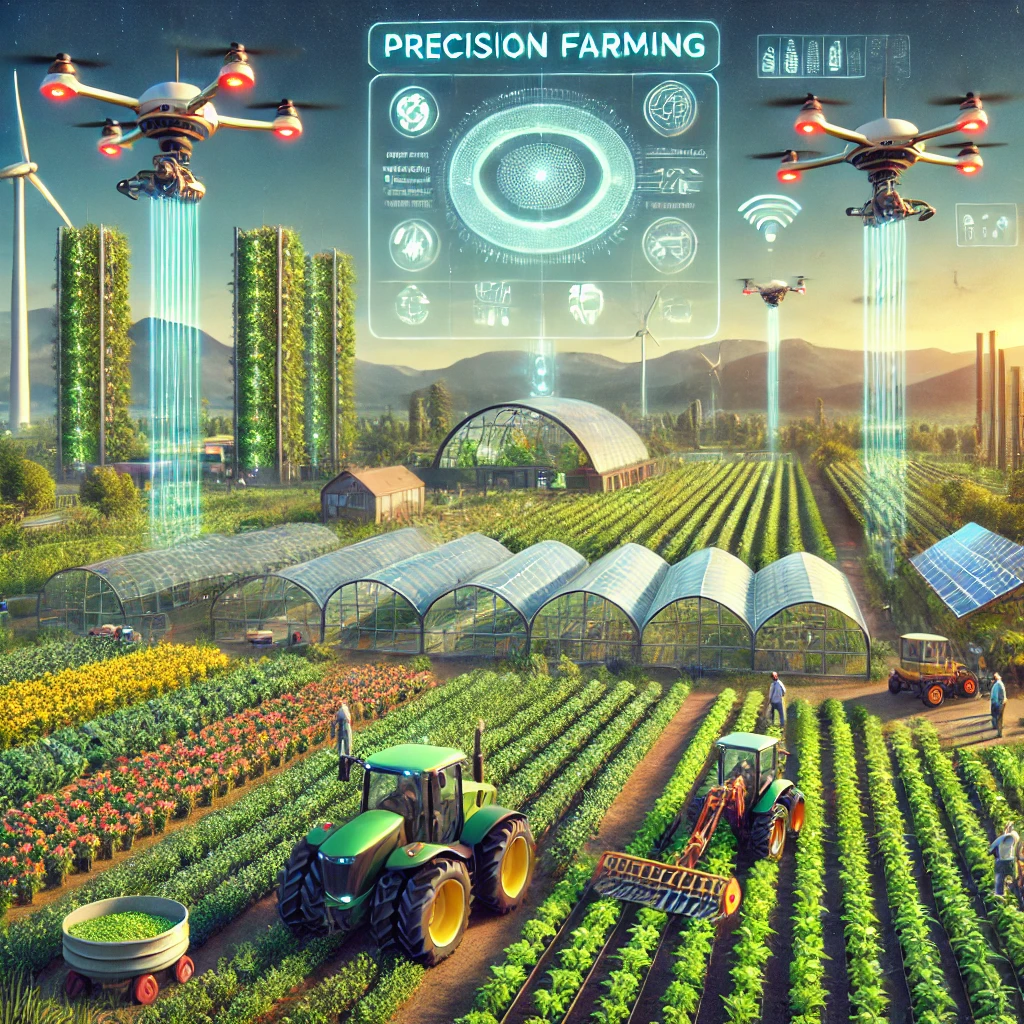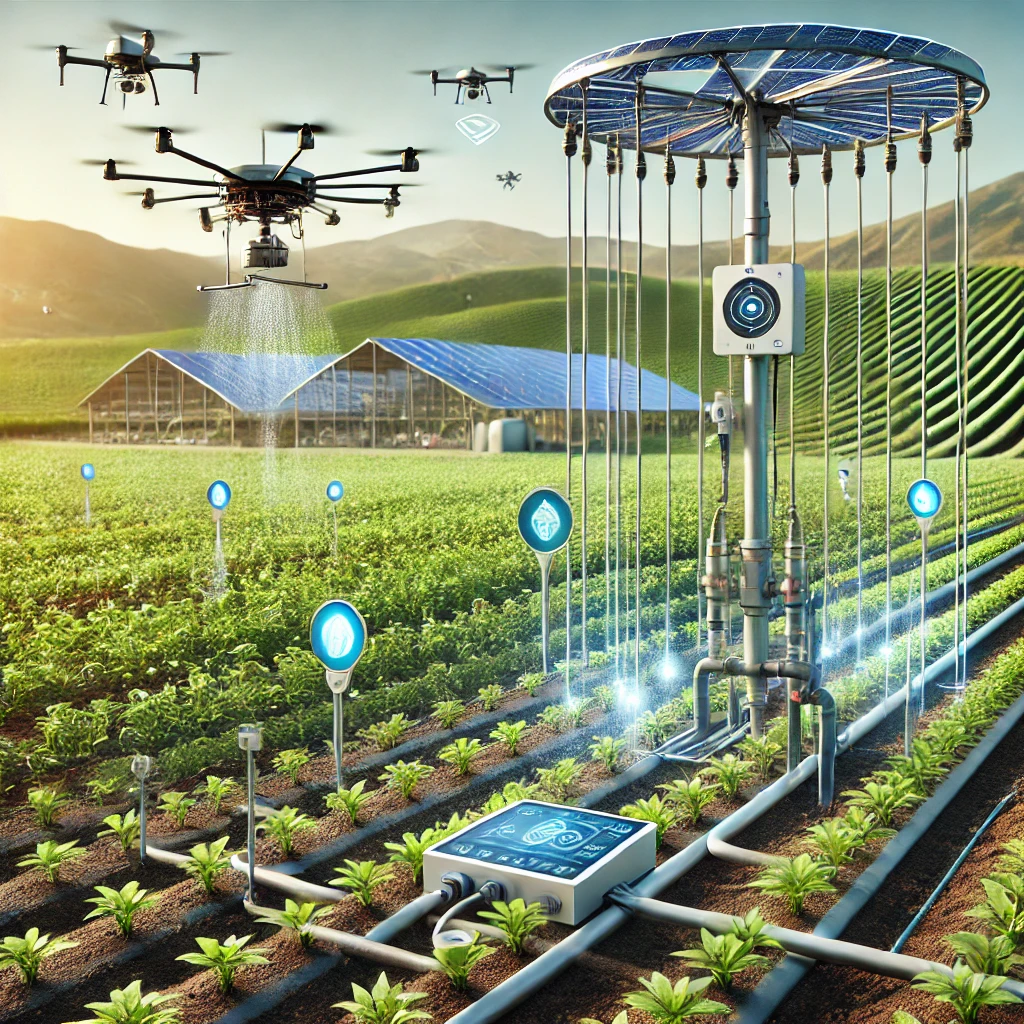User Ideas / Prospects
.jpg) Agriculture is the backbone of many economies. It plays a very important role in ensuring food security. With technological development, agriculture has undergone a radical change. This is where B.Tech in Agricultural Engineering comes into play.
Agriculture is the backbone of many economies. It plays a very important role in ensuring food security. With technological development, agriculture has undergone a radical change. This is where B.Tech in Agricultural Engineering comes into play.
This course might be for you if you are passionate about agriculture and technology. It combines the best of both worlds. Agricultural engineering is a specialized branch of engineering that primarily deals with enhancing agricultural productivity by incorporating innovative techniques.
In this blog, we will talk about what B.Tech Agricultural Engineering is. We will also guide you on how Engineer’s Heaven can help you achieve your goals.
B.Tech Agricultural Engineering is a four-year undergraduate program. It equips students with the knowledge to apply engineering principles to agriculture. The course focuses on various aspects of farming and food production, including machinery, soil management, irrigation, and post-harvest technology.
The syllabus covers both theoretical and practical concepts. Students learn about farm equipment, water resource management, and food preservation. They also study environmental impacts and sustainable practices.
This program is suited for those interested in modernizing agriculture. It is a multidisciplinary field that unites mechanical, civil, electrical, and chemical engineering.
The curriculum is designed to provide a balanced knowledge base. Here are some key subjects included in this program:
- Farm Machinery and Equipment: Learn the concepts of designing and maintaining farm tools.
- Soil and Water Conservation Engineering: Study how soil and water resources can be conserved.
- Irrigation and Drainage Engineering: Understand efficient irrigation systems.
- Post-Harvest Technology: Learn food storage and packaging methods.
- Renewable Energy in Agriculture: Explore sustainable energy sources for agricultural sectors.
- Agricultural Process Engineering: Understand how raw products are transformed into consumable goods.
B.Tech Agricultural Engineering offers numerous career prospects. Graduates can be employed in various sectors, including government agencies, private firms, and research institutions.
Some popular career options include:
- Agricultural Engineer
- Irrigation Engineer
- Food Process Engineer
- Soil Conservationist
- Research Scientist
The employment scope for agricultural engineers is expanding as sustainable farming gains importance. Qualified professionals are in high demand. Additionally, sectors like agri-tech and agribusiness provide ample opportunities.
Options for higher education also exist. Students can pursue an M.Tech or an MBA. Many choose to specialize in biotechnology or environmental engineering.
There is always something new in agriculture. Climate change and a growing population demand innovative solutions. Agricultural engineers develop technologies to improve efficiency and minimize waste.
This field is ideal for those passionate about addressing global issues. It offers opportunities to contribute to sustainable development. Agricultural engineering is a broad field with career prospects worldwide.
How Can Engineer’s Heaven Help You?Deciding on the right education path is always challenging. This is where Engineer’s Heaven steps in to assist. Our platform provides all the necessary information through the engineering entrance examination section.
Here’s how we can support you:
- Course information and descriptions for top colleges
- Admission and career advice from professionals
- Study material and sample papers
- Regularly updated scholarship and exam information
Our goal is to help students make clear and confident decisions. Whether you are searching for courses or preparing for entrance tests, we’ve got you covered.
For more resources, visit our website, Engineer’s Heaven. Do your homework and find out what you want.
B.Tech in Agricultural Engineering is an exciting course that bridges the gap between conventional farming and technology. The program offers significant career opportunities and is highly rewarding.
If you’re ready to get started, Engineer’s Heaven is here to help. The right information is the first step toward a successful career.
Join us to explore the engineering world. Together, we can build a sustainable future. Visit Engineer’s Heaven and start your journey today.
(Disclaimer: This statistics could be different in different part of World and Different timeline. this statistics has been generated based on data available till 2024 or relavant time span.)
.jpg) Agricultural Engineering is a career that allows those with a passion for agriculture and engineering to make a positive impact in the world. Is it the right path for you? It's time to delve into this field and discover how it fosters the development of a fruitful profession.
Agricultural Engineering is a career that allows those with a passion for agriculture and engineering to make a positive impact in the world. Is it the right path for you? It's time to delve into this field and discover how it fosters the development of a fruitful profession.
Imagine a world where technology and farming go hand in hand to revolutionize agriculture. That is the essence of agricultural engineering. These innovative professionals apply engineering concepts to farming practices. By presenting the findings of their research, they propose new methods to efficiently produce food, conserve resources, and protect the environment.
Agricultural engineering is a versatile profession with a wide range of specializations. Agricultural engineers are at the forefront of innovation, whether developing irrigation systems that use less water or designing equipment for Precision Farming. Here’s a glimpse into some exciting areas they work in:
- Precision Agriculture: Utilizing information and technology to improve crop yields and optimize resource use.
- Bio resource Engineering: Developing sustainable strategies for generating biofuels and managing waste.
- Livestock Engineering: Creating innovative solutions for housing, feeding, and waste management in animal farming.
- Food Processing Engineering: Ensuring food safety from the farm to processing, distribution, storage, and finally, the consumer.
Beyond the exciting blend of engineering and agriculture, several factors make this field an excellent career choice:
- Impact: Agricultural engineers directly address issues related to food production, resource conservation, and environmental sustainability. Their work has immediate and significant applications in feeding the planet and protecting the environment.
- Increasing Demand: The demand for agricultural engineers continues to grow as new challenges emerge in an ever-evolving environment.
- Good Salary Scale: Agricultural engineers enjoy competitive salaries, making it a well-paying profession.
- Diverse Working Environments: Agricultural engineers work in various settings, including research laboratories, farm consultancies, and other related fields.
If you have a passion for both engineering and agriculture, enjoy solving problems, and thrive in dynamic environments, agricultural engineering might be the perfect fit for you. Critical thinking, technological curiosity, and dedication to sustainable farming are the qualities that define an exceptional agricultural engineer.
Engineer’s Heaven is your gateway to a career in agricultural engineering. This comprehensive platform offers:
- Detailed Information: Learn about accredited programs, institutions, and the diverse subfields of agricultural engineering.
- Career Guidance: Explore career options, salary prospects, and employment opportunities.
- Industry Updates: Stay informed about the latest trends and innovations in agricultural engineering.
- Networking Opportunities: Connect with students, professionals, and mentors in the agricultural engineering community.
Agricultural engineering offers the chance to combine technical skills with a love for farming. In a world increasingly focused on sustainability, agricultural engineers are essential for feeding the population while safeguarding the environment. If you're seeking a career that is both meaningful and rewarding, consider exploring the intricate and innovative field of agricultural engineering.
Are you ready to get started? Visit Engineer’s Heaven today and unlock the potential of agricultural engineering.
Read Also... Precision agriculture and its Impact on crop yields
(Disclaimer: This statistics could be different in different part of World and Different timeline. this statistics has been generated based on data available till 2024 or relavant time span.)

Agriculture, once solely dependent on nature’s rhythms, is facing unprecedented challenges in the modern era. Climate change has introduced irregular weather patterns, making farming increasingly unpredictable and riskier. With the global population on the rise, food security is more important than ever, and it has become clear that the agricultural sector can no longer rely on favourable climates alone to feed the world. To address this, there is an urgent need for countries to integrate engineering and technology into farming practices. This combination is not just a luxury, but a necessity, as no one can expect that climate will always favour the farmers.
The impacts of climate change are already being felt across the globe, particularly in agriculture. Farmers are battling with extreme weather events such as droughts, floods, heatwaves, and unseasonable frosts. These changes directly affect crop yields, disrupt planting schedules, and reduce the predictability on which traditional farming methods rely.
In some regions, water scarcity is becoming a pressing issue, with aquifers drying up and rainfall patterns becoming unreliable. In others, soil fertility is declining due to erosion, desertification, and increased salinity caused by rising temperatures. The natural environment, which once provided a stable foundation for agriculture, is now in flux.
These challenges make it clear that relying solely on traditional practices is no longer feasible for modern farming. To protect food security and the livelihoods of farmers, agriculture must evolve, and this is where engineering and technology come into play.
Engineering has a crucial role to play in transforming agriculture to meet the challenges posed by an unpredictable climate. Through innovative infrastructure and systems, engineering can make farming more efficient, sustainable, and climate-resilient.
Modern Irrigation Systems: In water-scarce regions, engineering has already made a significant impact with the development of advanced irrigation techniques such as drip irrigation and automated sprinklers. These systems ensure that water is used efficiently, minimizing waste and ensuring crops receive sufficient hydration, even during droughts. Some systems can even be connected to weather forecasting models to automatically adjust water usage based on upcoming conditions.
Greenhouses and Controlled Environments: Engineers have developed greenhouses that create artificial environments for growing crops year-round, shielding plants from the unpredictability of external weather. Through climate control technologies, crops can be grown in areas with harsh climates, expanding the agricultural possibilities for regions previously deemed unsuitable for farming.
Soil and Water Management: Soil erosion, depletion, and salinity are major threats to sustainable agriculture. Engineering solutions like contour plowing, terracing, and artificial drainage systems help retain soil nutrients and prevent waterlogging, enabling farms to remain productive even in challenging environmental conditions.
Mechanization and Automation: Engineering has revolutionized labor-intensive farming through the use of automated machinery. Tractors, robotic planters, and harvesters allow for faster, more efficient cultivation and harvesting of crops. These innovations are especially important in regions where rural labor is diminishing or where the costs of manual farming are prohibitive.
Technology, particularly in the digital realm, offers tools that enhance productivity and improve decision-making for farmers. By integrating technology into agricultural practices, countries can empower their farmers to make data-driven decisions and respond proactively to changing conditions.
Precision Agriculture: Using GPS, drones, and remote sensing technologies, precision farming allows farmers to monitor their fields at an unprecedented level of detail. Sensors track everything from soil moisture to nutrient levels, allowing for targeted interventions such as precise application of fertilizers, water, and pesticides. This not only increases efficiency but also reduces the environmental impact of farming practices.
Smart Farming and IoT: The Internet of Things (IoT) enables smart farming, where interconnected devices provide real-time data on every aspect of farming operations. Sensors placed in fields, storage units, and machinery provide continuous feedback, allowing farmers to monitor crop growth, storage conditions, and equipment performance from anywhere.
Artificial Intelligence and Data Analytics: AI-driven platforms analyze massive datasets, providing predictive insights into weather patterns, pest outbreaks, and crop performance. By anticipating problems before they occur, AI helps farmers adapt quickly to changing conditions, improving yields and reducing losses due to unforeseen challenges.
Biotechnology and Genetically Modified Crops: Advances in biotechnology have enabled the development of crops that can withstand extreme weather conditions, resist pests, and grow in marginal soils. Genetically modified organisms (GMOs) are particularly important in regions facing food shortages, as these crops can increase food production while reducing the need for chemical inputs.
Integrating engineering and technology into agriculture is not just an option; it is a necessity for countries around the world. Whether developing or developed, every nation faces unique challenges that impact their agricultural sectors, but the common thread is the need for innovation to address these challenges.
For developing nations, where agriculture forms the backbone of the economy and food security is often precarious, engineering and technology provide pathways to modernization and resilience. Mechanized tools can boost productivity, while digital technologies can connect smallholder farmers to information, resources, and markets that were previously out of reach.
In developed nations, engineering and technology are essential to addressing sustainability concerns. As agricultural land becomes scarcer due to urbanization and industrial expansion, the need to maximize yields from existing farmland becomes critical. Precision farming, automated machinery, and biotechnology enable farmers to produce more food on less land while minimizing environmental impact.
Moreover, the integration of these innovations can help countries mitigate the effects of climate change on agriculture. By developing systems that are less reliant on external weather conditions, nations can ensure that their agricultural sectors remain productive and reliable, regardless of future climate disruptions.
The modern challenges facing agriculture—climate change, resource scarcity, population growth, and the need for sustainability—are too complex to be addressed by traditional farming methods alone. Engineering and technology provide the tools, systems, and innovations necessary to meet these challenges head-on. By adopting advanced irrigation systems, precision farming, biotechnology, and automated machinery, countries can enhance agricultural productivity, reduce waste, and improve resilience to unpredictable climates.
In a world where no one can expect the climate to always favour farmers, connecting agriculture with engineering and technology is not just a strategy for future growth—it is the only viable solution for overcoming the majority of the issues that plague modern farming today. Countries that embrace this connection will not only ensure food security for their populations but will also safeguard their agricultural sectors against the uncertainties of tomorrow.
list of notable African agricultural engineers, scientists, and innovators whose contributions have been crucial in transforming the agricultural landscape of the continent, improving food security, and combating hunger. These individuals have introduced innovations and policies that have had a lasting impact on African agriculture, empowering farmers and ensuring sustainable development.
Key African Agricultural Engineers, Scientists, and Innovators1. Akinwumi Adesina (1960–Present) – Nigeria

- Contribution: As President of the African Development Bank and a former Nigerian Minister of Agriculture, Adesina played a crucial role in driving agricultural transformation across Africa, launching initiatives like the Alliance for a Green Revolution in Africa (AGRA).
- Impact: His efforts have promoted the use of modern farming techniques, fertilizers, and agricultural policies, significantly increasing food security across Africa. He received the World Food Prize in 2017.
- Famous Quote: "The future of Africa’s development depends on agriculture, and agriculture depends on youth."
- Contribution: An agricultural scientist and plant breeder, Ejeta developed drought-resistant and pest-resistant sorghum varieties, critical to ensuring food security in sub-Saharan Africa.
- Impact: His work has been instrumental in improving the productivity of sorghum, a staple food in Africa, and his innovations have benefitted millions of smallholder farmers. He was awarded the World Food Prize in 2009.
- Famous Quote: "Science is a powerful tool to defeat hunger and poverty, but it requires dedication and global cooperation."

- Contribution: A plant pathologist and biotech expert, Wambugu has been a key figure in promoting biotechnology in African agriculture, particularly for smallholder farmers. She led efforts to develop genetically modified (GM) crops that are disease-resistant and higher yielding.
- Impact: Her work has improved food security in Kenya and other parts of Africa by increasing crop resilience to diseases and pests, especially in staple crops like maize.
- Famous Quote: "Biotechnology is not just about science, it’s about feeding the hungry and improving livelihoods."

- Contribution: As former Secretary-General of the United Nations, Annan was a vocal advocate for agricultural development in Africa. He served as the Chairman of the Alliance for a Green Revolution in Africa (AGRA), promoting agricultural reforms and innovation.
- Impact: His leadership at AGRA was key in driving efforts to improve seed quality, agricultural productivity, and farmer support systems across the continent.
- Famous Quote: "The future of Africa’s development depends on transforming its agriculture."

- Contribution: Although born in Israel, Hillel's groundbreaking work in micro-irrigation techniques has had a lasting impact on African agriculture. His irrigation innovations helped regions facing water scarcity optimize water use for agricultural productivity.
- Impact: His techniques have been adopted in arid and semi-arid regions of Africa, contributing to food security in water-scarce environments.
- Famous Quote: "Water and land are the essential ingredients for the survival and prosperity of humanity."

- Contribution: Jones is an agricultural scientist known for developing the New Rice for Africa (NERICA) hybrid, which significantly boosts rice yields and is resistant to drought and disease.
- Impact: His work on rice breeding has improved rice production across Africa, enhancing food security and reducing dependence on imported rice.
- Famous Quote: "Agricultural transformation in Africa is possible with the right technology and the involvement of our farmers."
- Contribution: A renowned nutritionist and agricultural scientist, Oniang'o has worked tirelessly to improve food and nutrition security in Africa. She has been an advocate for women farmers and sustainable agricultural practices.
- Impact: Her research and advocacy have helped improve nutrition policies and practices, leading to healthier communities and more productive agricultural systems in Kenya and across Africa.
- Famous Quote: "The true wealth of a nation lies in the health of its people, which starts with the food they eat."

- Contribution: A prominent scientist and academic, Juma was a leading advocate for the use of science and technology to boost agricultural productivity in Africa. He promoted the use of biotechnology and agricultural innovations to tackle food insecurity.
- Impact: His work on agricultural policy and technological innovation has shaped global and African agricultural strategies, helping to advance the continent’s agricultural development.
- Famous Quote: "Innovation is the engine for growth in Africa’s agriculture."
- Contribution: Though Filipino by nationality, Dar’s work in Africa as Director General of the International Crops Research Institute for the Semi-Arid Tropics (ICRISAT) has had a profound impact on African agriculture. He promoted agricultural research for dryland farming and crop improvement.
- Impact: His research on drought-resistant crops has improved agricultural productivity in semi-arid regions of Africa, helping millions of farmers adapt to climate change.
- Famous Quote: "Research is the key to unlocking the potential of African agriculture."
- Contribution: A former Rwandan Minister of Agriculture and President of AGRA, Kalibata has been a leading figure in advancing agricultural transformation across Africa, focusing on smallholder farmer support and sustainable farming practices.
- Impact: Under her leadership, AGRA has helped millions of African farmers increase their productivity and income through access to better seeds, technologies, and market systems.
- Famous Quote: "Agriculture is at the heart of Africa’s future, and we must invest in it for our people to thrive."

- Contribution: An agricultural scientist and soil expert, Bationo has worked extensively on improving soil fertility and sustainable farming practices in the Sahel region of Africa. His research focuses on soil health and nutrient management.
- Impact: His innovations in soil management have helped restore degraded soils and boost agricultural productivity in some of the most challenging environments in Africa.
- Famous Quote: "Healthy soils are the foundation of a thriving agricultural system."

Joseph DeVries (Present) – Kenya: Founder of the African Seed Access Index, DeVries has worked on improving access to high-quality seeds for smallholder farmers across Africa.
- Famous Quote: "Seeds are the foundation of agriculture, and access to quality seeds is the first step toward food security."
Kendi Mutungi (Present) – Kenya: An agricultural scientist focusing on post-harvest losses and food preservation, Mutungi advocates for improving storage and processing technologies to reduce food waste in Africa.
- Famous Quote: "Reducing post-harvest losses is crucial to ending hunger in Africa."
These African agricultural engineers and scientists have made remarkable contributions to their countries and the continent as a whole, ensuring better food security, productivity, and resilience. Their work in biotechnology, soil management, water conservation, and agricultural policy has provided lasting solutions to the food challenges Africa faces, bringing hope and prosperity to millions of people.
Note this list I did text without any particular order and best of my memory text me if you don't agree any of i mentioned or someone i Missed.
modern-era agricultural engineers, including their famous quotes and the addition of M. S. Swaminathan, one of the most significant contributors to agricultural development:
1. M. S. Swaminathan (1925–2023)
- Contribution: Known as the father of the Green Revolution in India, Swaminathan worked on introducing high-yielding varieties of wheat and rice, helping India achieve self-sufficiency in food production.
- Impact: His work prevented famines in India and contributed significantly to global food security.
- Famous Quote: "If agriculture goes wrong, nothing else will have a chance to go right."

- Contribution: Founder of International Development Enterprises (iDE), Polak developed affordable farming technologies like low-cost drip irrigation systems for smallholder farmers in developing countries.
- Impact: His innovations have helped millions of small-scale farmers in poverty-stricken regions increase their yields and income, combating hunger and improving livelihoods.
- Famous Quote: "The only way to end poverty is to create jobs and incomes for those who live on less than a dollar a day."

- Contribution: Founder of East-West Seed, Groot developed high-quality vegetable seeds suited to the tropical climates of Southeast Asia and other developing regions.
- Impact: His work has dramatically increased food security and smallholder farmer incomes by providing access to better seeds, leading to higher yields of nutritious vegetables.
- Famous Quote: "Seeds are the starting point of agriculture. They determine the quality of life for millions of small farmers around the world."

- Contribution: An agricultural economist and engineer, Adesina has been a leading figure in launching initiatives like the Alliance for a Green Revolution in Africa (AGRA).
- Impact: His work in fertilizer use, modern farming techniques, and agricultural policy has significantly increased food security across Africa.
- Famous Quote: "The future of Africa’s development depends on agriculture, and agriculture depends on youth."

- Contribution: A plant pathologist and geneticist, Ronald focuses on genetically engineering rice to be resistant to flooding and other climate challenges.
- Impact: Her work has improved crop resilience to climate change, particularly in flood-prone regions of Asia, helping to stabilize food production.
- Famous Quote: "To help feed a growing population, we need to embrace a broad array of agricultural technologies, including organic farming and genetic engineering."

- Contribution: A soil scientist and agricultural engineer, Lal has been instrumental in promoting techniques that improve soil health and carbon sequestration.
- Impact: His work is vital in combating soil degradation and enhancing agricultural productivity, while also helping mitigate climate change.
- Famous Quote: "Soil is the cornerstone of food security. We need to take care of it as we would take care of ourselves."

- Contribution: An agricultural economist and researcher, Brookes analyzes the economic and environmental benefits of genetically modified (GM) crops.
- Impact: His work has shown how GM crops contribute to increased food production and sustainability, helping to address global hunger.
- Famous Quote: "GM technology is not a magic bullet, but it can play an important part in the solution to global food security."

- Contribution: Nutritionist and agricultural engineer with extensive experience in leading food security programs in Africa, Asia, and Latin America.
- Impact: Woldt focuses on integrating nutrition-sensitive agriculture into programs to reduce hunger and malnutrition, improving food security globally.
- Famous Quote: "Sustainable agriculture is key to improving nutrition and ensuring food security for all."
- Contribution: A climate scientist and agricultural engineer, Lobell studies the effects of climate change on food production and develops strategies to improve crop yields.
- Impact: His work has influenced agricultural policies and practices to address food security in a changing climate.
- Famous Quote: "The future of food security depends on how we adapt to the changing climate."
- Contribution: An agricultural scientist and plant breeder, Ejeta developed drought-resistant and pest-resistant sorghum varieties.
- Impact: His innovations have improved food security in Africa, especially in regions where sorghum is a staple food.
- Famous Quote: "Science is a powerful tool to defeat hunger and poverty, but it requires dedication and global cooperation."
- Contribution: Founder of HarvestPlus, Bouis pioneered biofortification, improving the nutritional value of staple crops like rice, wheat, and maize by breeding them to contain higher levels of essential vitamins and minerals.
- Impact: His work has combated micronutrient deficiencies, improving health and food security in developing countries.
- Famous Quote: "Biofortification is about empowering the poor with access to better nutrition through the crops they grow and eat."
These modern engineers, along with historical figures, have made significant contributions to agriculture, helping to avert global hunger. Their work, from soil health to crop genetics and sustainable farming practices, continues to have a profound impact on ensuring food security for a growing population. Their words reflect their dedication to solving one of the world's most pressing challenges.
Note: This list is based on recent News Materials and not in particular order if you think someone is not deserved on the list or someone i missed please write down in comment.
Modern irrigation technology offers numerous benefits that enhance agricultural productivity, sustainability, and resource management. Here are some key advantages:
1. Water Conservation- Efficient Use: Modern systems, such as drip and sprinkler irrigation, apply water directly to the plant roots, minimizing evaporation and runoff.
- Reduced Waste: Precision irrigation techniques ensure that water is used only where and when needed, significantly reducing water waste.
- Optimal Water Supply: By providing the right amount of water at the right time, modern irrigation increases crop growth and yields.
- Consistency: Irrigation technology allows for consistent watering, which is crucial for maintaining healthy crops and maximizing production.
- Adaptation to Climate Change: Advanced irrigation systems can help farmers adapt to changing weather patterns and prolonged droughts by efficiently managing limited water resources.
- Storage Solutions: Technologies such as rainwater harvesting and water storage systems enable farmers to collect and store water during rainy seasons for use during dry periods.
- Reduced Erosion: Modern irrigation practices minimize soil erosion by reducing runoff and maintaining soil moisture.
- Nutrient Management: Systems like drip irrigation can be combined with fertigation (applying fertilizers through the irrigation system), allowing for better nutrient distribution and reduced leaching.
- Automation: Automated irrigation systems can be programmed to operate on schedules, reducing the need for manual labor and allowing farmers to focus on other important tasks.
- Remote Monitoring: Advanced technologies, such as sensors and smart irrigation controllers, enable farmers to monitor soil moisture levels and manage irrigation remotely, optimizing labor resources.
- Reduced Water Costs: Efficient irrigation methods lower water bills and operational costs, particularly in areas where water is expensive or scarce.
- Lower Energy Consumption: Drip and low-pressure systems can reduce energy costs associated with pumping water.
- Uniform Growth: Consistent watering leads to more uniform crop growth, which can improve the overall quality of the produce.
- Reduced Disease Risk: Proper irrigation management can help prevent water stress and associated plant diseases, leading to healthier crops.
- Sustainable Practices: Modern irrigation techniques promote sustainable agricultural practices by reducing the environmental impact of water extraction and usage.
- Biodiversity Preservation: Efficient irrigation can help maintain local ecosystems by reducing the diversion of natural water sources for agricultural use.
- Data-Driven Decisions: Modern irrigation systems can integrate with precision agriculture technologies, allowing for real-time monitoring and data analysis to optimize water use and improve decision-making.
- Adaptable Systems: Modern irrigation technologies can be scaled to fit various farm sizes, making them suitable for both smallholder and large commercial farms.
In summary, modern irrigation technology plays a crucial role in enhancing agricultural efficiency, sustainability, and resilience, benefiting farmers, the environment, and global food security.
Modern irrigation technologies offer numerous benefits that extend beyond water savings, impacting crop yields, environmental sustainability, and farm efficiency. For agriculture engineers, whether students or experienced professionals, understanding these advantages is essential for promoting and implementing these systems in real-world agricultural settings.
Water Savings
One of the most significant benefits of modern irrigation systems is their ability to conserve water. Traditional irrigation methods can waste up to 50% of water due to evaporation, runoff, and inefficient application. In contrast, technologies like drip irrigation and smart sensors ensure that water is applied precisely where and when it’s needed, reducing waste by as much as 30-60%. This is especially crucial in areas facing water shortages or in regions with unpredictable rainfall patterns. For engineers, designing systems that maximize water efficiency is key to sustainable agriculture.
Increased Crop Yields
By delivering water in a controlled and timely manner, modern irrigation systems directly enhance crop health and productivity. Drip irrigation, for instance, allows for consistent moisture levels at the root zone, promoting steady growth and improving yields by up to 40% in some crops. Smart systems that adjust irrigation based on real-time data also help avoid plant stress caused by over- or under-watering. Agriculture engineers can leverage these benefits to develop irrigation solutions that not only save water but also significantly increase agricultural output.
Reduced Environmental Impact
Modern irrigation systems play a critical role in reducing the environmental footprint of farming. Efficient water use helps prevent soil erosion, salinization, and nutrient leaching, all of which can degrade land quality over time. Furthermore, technologies that minimize energy consumption in pumping and distributing water contribute to lower greenhouse gas emissions. For professionals designing eco-friendly farming systems, these benefits are increasingly important as the agricultural sector moves toward more sustainable practices.
While modern irrigation technologies offer immense potential, their widespread adoption faces several challenges. However, these challenges also present valuable opportunities for both agriculture engineering students and professionals to innovate, overcome barriers, and advance the field.
ChallengesOne of the main challenges in implementing modern irrigation systems is the high upfront cost of technology. Systems such as drip irrigation or advanced sensor networks require significant initial investments, which can be a deterrent for small-scale farmers. Additionally, there is often a lack of technical expertise among farmers and laborers to operate and maintain these sophisticated systems, particularly in developing regions. Engineers must address these gaps by designing cost-effective solutions and providing training and support for system management.
Another challenge is infrastructure limitations in rural areas, where reliable access to electricity, internet, or water sources may be insufficient to support smart irrigation systems. Overcoming these barriers will require engineers to innovate with off-grid solutions, solar-powered pumps, or decentralized water systems to ensure technology can be applied in diverse settings.
OpportunitiesDespite these challenges, the rise of modern irrigation technology presents significant career and innovation opportunities for agriculture engineers. As demand for sustainable water management solutions grows, there is a rising need for professionals who can design, implement, and manage these advanced systems. Engineers can specialize in areas such as precision agriculture, integrating technologies like AI, IoT, and automation to enhance irrigation efficiency.
Furthermore, there are increasing government incentives and funding for projects that focus on water conservation and sustainable farming practices. Engineers can collaborate with governmental and international organizations to create scalable solutions that address the water scarcity crisis. By focusing on the opportunities to innovate, future engineers can play a pivotal role in transforming agricultural practices worldwide, ensuring that farming becomes more productive, sustainable, and resilient to climate challenges.
Modern irrigation systems represent a critical innovation in the future of agriculture, offering solutions to some of the industry's most pressing challenges, such as water scarcity, declining crop yields, and environmental degradation. For agriculture engineering students and professionals, mastering these technologies is not just an academic exercise—it’s essential for driving sustainable agricultural practices in the real world. Whether through the use of sensors, AI, or precision irrigation methods, engineers are uniquely positioned to revolutionize water management in farming, ensuring higher productivity with fewer resources.
As the global demand for food continues to rise, so too does the importance of efficient irrigation systems. By embracing and advancing these technologies, agricultural engineers can play a leading role in shaping the future of farming, making it more resilient, sustainable, and productive. The future of agriculture depends on today’s engineers to develop solutions that will meet the needs of tomorrow’s world.
Drones are playing a pivotal role in the evolution of unmanned farms by providing a range of capabilities that enhance precision agriculture, improve farm management, and increase overall efficiency. Here’s how drones are contributing to the development of unmanned farms:

- Aerial Surveillance: Drones equipped with high-resolution cameras and multispectral sensors can capture detailed images of crops from above. These images help farmers monitor crop health, identify stressed areas, and detect issues like nutrient deficiencies, disease, or pest infestations.
- Early Detection: By regularly surveying fields, drones can spot early signs of problems, allowing farmers to take corrective action before issues become widespread. This leads to better crop management and higher yields.
- Targeted Spraying: Drones can be used for precision spraying of pesticides, herbicides, and fertilizers. They can apply these substances only where needed, reducing chemical use and minimizing environmental impact.
- Variable Rate Application: Drones can be programmed to adjust the application rate of inputs based on the specific needs of different areas within a field. This ensures that each part of the field receives the optimal amount of treatment, leading to more uniform crop growth and better resource utilization.
- Aerial Seeding: Some drones are capable of dropping seeds directly into the soil, enabling aerial seeding of crops, especially in difficult-to-reach or rugged terrain. This is particularly useful for reforestation efforts or planting cover crops.
- Precision Planting: Drones equipped with seed dispensers can plant seeds with high precision, ensuring even distribution and optimal spacing for crop growth.
- Soil Mapping: Drones can carry sensors that measure soil properties, such as moisture content, temperature, and nutrient levels. This data is used to create detailed soil maps, helping farmers understand soil variability and make informed decisions about irrigation, fertilization, and crop rotation.
- Topographic Mapping: By creating 3D maps of the terrain, drones help farmers plan more effective irrigation systems, manage water flow, and prevent soil erosion.
- Water Stress Detection: Drones equipped with thermal cameras can detect water stress in crops by identifying temperature variations. This helps farmers optimize irrigation schedules and ensure that crops receive adequate water.
- Monitoring Irrigation Systems: Drones can fly over irrigation systems to check for leaks, blockages, or inefficiencies, ensuring that water is being distributed evenly and effectively across the farm.
- Real-Time Data: Drones provide real-time data on various aspects of farm operations, enabling quick decision-making. The data collected can be analyzed to identify trends, predict yields, and optimize resource allocation.
- Integration with AI and IoT: Drones can be integrated into broader IoT systems on the farm, working in conjunction with ground-based sensors and automated machinery. AI algorithms can analyze drone data to provide actionable insights, making farm management more precise and efficient.
- Accurate Field Maps: Drones create accurate maps of fields, including boundaries, crop zones, and infrastructure. These maps are essential for planning and optimizing farm operations, especially in large or complex fields.
- Plant Counting and Density Measurement: Drones can count individual plants and measure plant density across fields, helping farmers monitor crop establishment and adjust planting strategies as needed.
- Crop Maturity Assessment: Drones can monitor crop maturity levels across large fields, helping farmers determine the optimal time for harvesting. This ensures that crops are harvested at peak quality and reduces the risk of losses.
- Guiding Autonomous Harvesters: Drones can provide aerial views and data that guide autonomous harvesting machines, improving the efficiency and accuracy of the harvest.
- Herd Surveillance: Drones can be used to monitor livestock, tracking their movements, health, and behavior. This is especially useful for managing large herds or in difficult terrain.
- Grazing Management: By monitoring pasture conditions and livestock distribution, drones help farmers manage grazing patterns, ensuring sustainable use of grazing lands.
- Climate and Weather Data: Drones can be equipped with sensors to monitor local climate and weather conditions, helping farmers adapt to changing conditions and plan their activities accordingly.
- Biodiversity and Ecosystem Health: Drones can be used to monitor the biodiversity and health of ecosystems on and around the farm, ensuring that farming practices are environmentally sustainable.
Drones are transforming unmanned farms by providing critical data, enabling precision agriculture, and automating various tasks. They allow for more efficient resource use, reduce labor costs, and increase crop yields, making farming more sustainable and profitable. As drone technology continues to evolve, it will likely become an even more integral part of modern agriculture, driving further innovation and efficiency in unmanned farms.
Sustainable food production through agricultural engineering involves a combination of techniques, technologies, and practices designed to increase efficiency, reduce environmental impact, and ensure long-term viability. Here are several key strategies:
Precision Agriculture:
- GPS and GIS Technologies: Use GPS for field mapping and GIS for analyzing soil, crop, and field data to make precise planting, fertilizing, and harvesting decisions.
- Remote Sensing: Employ drones and satellites to monitor crop health, soil conditions, and water usage.
- Variable Rate Technology (VRT): Apply inputs like fertilizers and pesticides at variable rates across a field, optimizing their use and minimizing waste.
Soil Health Management:
- Cover Cropping: Plant cover crops to improve soil structure, increase organic matter, and prevent erosion.
- Crop Rotation: Rotate different crops in the same field to disrupt pest cycles and improve soil fertility.
- Conservation Tillage: Reduce tillage to maintain soil structure, reduce erosion, and increase water retention.
Water Management:
- Efficient Irrigation Systems: Implement drip or sprinkler irrigation systems to reduce water use and increase efficiency.
- Rainwater Harvesting: Collect and store rainwater for irrigation purposes.
- Soil Moisture Sensors: Use sensors to monitor soil moisture levels and irrigate only when necessary.
Integrated Pest Management (IPM):
- Biological Controls: Use natural predators or parasites to control pest populations.
- Cultural Practices: Implement practices like crop rotation and intercropping to reduce pest habitats.
- Chemical Controls: Use pesticides as a last resort and select those with minimal environmental impact.
Energy Efficiency:
- Renewable Energy Sources: Incorporate solar, wind, or bioenergy systems to power agricultural operations.
- Energy-Efficient Equipment: Use modern, energy-efficient machinery and optimize their use to reduce fuel consumption.
Waste Reduction and Recycling:
- Composting: Convert organic waste into compost to enrich soil.
- Residue Management: Utilize crop residues for mulching or as animal feed.
- Biodegradable Packaging: Develop and use biodegradable packaging materials for food products.
Genetic Improvement:
- Breeding and Biotechnology: Develop crop varieties that are more resistant to pests, diseases, and environmental stresses.
- GMO and CRISPR Technologies: Use genetic modification and gene editing techniques to enhance crop resilience and productivity.
Agroecology and Permaculture:
- Agroforestry: Integrate trees and shrubs into agricultural landscapes to improve biodiversity and ecosystem services.
- Polyculture: Grow multiple crops in the same space to mimic natural ecosystems and increase resilience.
Data and Analytics:
- Big Data and IoT: Utilize data analytics and Internet of Things (IoT) devices to monitor and optimize all aspects of agricultural production.
- Farm Management Software: Implement software solutions to manage and analyze farm operations more efficiently.
Education and Training:
- Farmer Training Programs: Educate farmers on sustainable practices and technologies.
- Research and Development: Invest in R&D to continuously improve sustainable agricultural methods.
Implementing these strategies requires a holistic approach, considering economic, environmental, and social factors to ensure that agricultural practices are truly sustainable.
Sustainable agriculture is significantly transforming the food industry by promoting practices that are environmentally friendly, economically viable, and socially responsible. Here are some key ways in which sustainable agriculture is changing the food industry:
1. Environmental Impact Reduction- Resource Efficiency: Sustainable agriculture emphasizes the efficient use of resources such as water, energy, and soil. Techniques like drip irrigation, crop rotation, and conservation tillage help reduce resource consumption and minimize environmental impact.
- Biodiversity Preservation: By promoting diverse cropping systems and integrating pest management practices, sustainable agriculture helps maintain and enhance biodiversity, which is crucial for resilient ecosystems.
- Reduced Chemical Use: Sustainable practices reduce the reliance on synthetic fertilizers and pesticides, leading to food products with fewer chemical residues. This contributes to healthier food options for consumers.
- Organic Farming: The rise of organic farming, a subset of sustainable agriculture, has led to increased availability of organic food products that are grown without synthetic chemicals and GMOs.
- Cost Savings: Sustainable farming practices can lead to long-term cost savings for farmers through reduced input costs and improved soil health, which enhances productivity over time.
- Market Opportunities: There is a growing market demand for sustainably produced food. Farmers who adopt sustainable practices can tap into premium markets, such as organic and fair-trade, which often command higher prices.
- Fair Labor Practices: Sustainable agriculture often involves fair labor practices, ensuring that farm workers receive fair wages and work in safe conditions.
- Community Support: Local and regional food systems supported by sustainable agriculture strengthen communities by keeping food production and consumption local, reducing transportation costs and supporting local economies.
- Precision Agriculture: Advances in technology, such as GPS-guided equipment, drones, and data analytics, enable more precise and sustainable farming practices. These technologies help optimize input use, reduce waste, and increase efficiency.
- Biotechnology: Sustainable agriculture incorporates biotechnological innovations, such as genetically modified crops designed to be more resistant to pests and diseases, reducing the need for chemical interventions.
- Carbon Sequestration: Sustainable practices such as cover cropping, agroforestry, and reduced tillage help sequester carbon in the soil, contributing to climate change mitigation.
- Resilience Building: By enhancing soil health and promoting biodiversity, sustainable agriculture increases the resilience of farming systems to climate change and extreme weather events.
- Informed Choices: Growing awareness among consumers about the environmental and social impacts of their food choices is driving demand for sustainably produced food. This shift in consumer behavior is encouraging more producers and retailers to adopt sustainable practices.
- Labeling and Certification: Certifications such as USDA Organic, Fair Trade, and Rainforest Alliance provide consumers with information about the sustainability of their food, enabling them to make informed purchasing decisions.
- Government Support: Many governments are recognizing the importance of sustainable agriculture and are providing incentives, subsidies, and support programs to encourage farmers to adopt sustainable practices.
- International Agreements: Global initiatives and agreements, such as the United Nations' Sustainable Development Goals (SDGs), emphasize sustainable agriculture as a critical component of sustainable development.
- Food Waste Minimization: Sustainable agriculture promotes practices that reduce food waste throughout the supply chain, from farm to table. This includes better harvesting techniques, improved storage and transportation, and encouraging the use of imperfect but edible produce.
- Circular Economy: The integration of circular economy principles in agriculture, such as composting and recycling agricultural by-products, helps create a more sustainable and efficient food system.
- Traceability: Sustainable agriculture often involves greater transparency and traceability in the food supply chain. Consumers and retailers can track the origins of their food, ensuring it meets sustainability standards.
- Ethical Sourcing: Retailers and food companies are increasingly committing to sourcing ingredients sustainably, which drives changes in agricultural practices at the production level.
In summary, sustainable agriculture is reshaping the food industry by promoting environmental stewardship, improving food quality, ensuring economic viability, enhancing social responsibility, and driving technological and policy innovations. These changes are leading to a more sustainable and resilient food system that benefits producers, consumers, and the planet.


